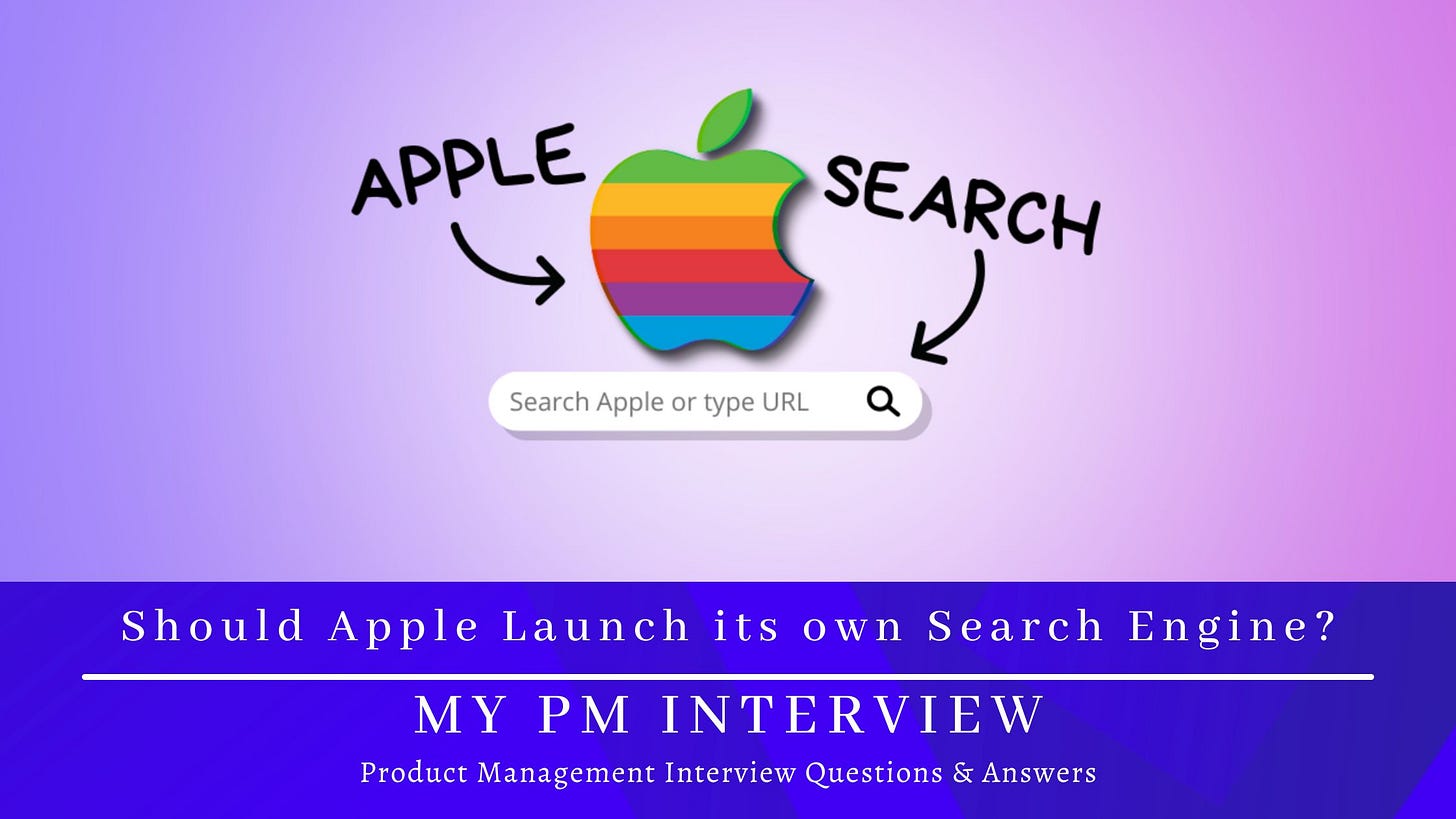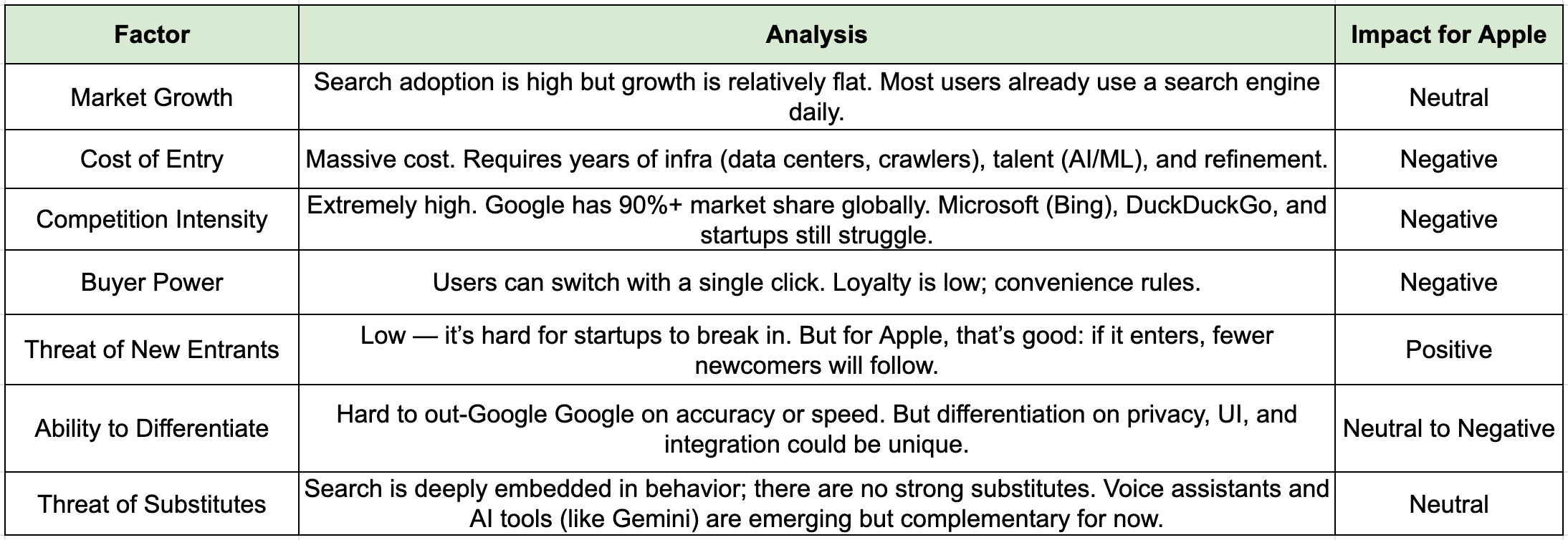Product Strategy: Should Apple launch its own search engine?
Apple Product Strategy Interview : Should Apple launch its own search engine?
Before recommending whether Apple should launch its own search engine, it’s important to unpack what this decision actually entails and what’s at stake. This framing sets the foundation for the rest of the analysis.
What Does “Launching a Search Engine” Mean for Apple?
There are several interpretations of "launching a search engine," and the product scope can vary dramatically based on how it's defined:
A Full Web Search Engine like Google/Bing-scale product that crawls, indexes, and ranks the entire internet.
A Vertical Search Engine focused on specific content domains — e.g., apps (App Store), music (Apple Music), products (Apple Store).
A Private On-Device Search (Spotlight/Siri using federated learning, without web crawling)
Safari Search Engine Alternative that replaces Google as the default in Safari on iOS and macOS.
Key Clarifying Question for Interview:
Are we discussing a full-scale Google competitor, or something more integrated and Apple ecosystem–centric (e.g., Spotlight 2.0)?
1. What Does Apple Do Today?
Apple doesn’t have its own full web search engine but:
Safari’s default search engine is Google, which pays Apple ~$15–20B/year for that position.
Spotlight & Siri use Bing and other third-party providers in the background.
Apple Maps, App Store Search, and Apple Music are examples of controlled, vertical search.
Thus, Apple already delivers multiple search-like experiences, just not via a centralized, general-purpose engine.
Strategic Leverage Points Already in Place
Apple controls the operating system and browser defaults on billions of devices — a huge distribution advantage.
It leads in privacy-first brand perception. A search engine built on these principles would resonate with its users.
Apple excels at keeping users inside its walled ecosystem — a search engine could deepen this.
Why Consider a Search Engine Now?
There are a few possible strategic reasons Apple might explore this:
Reduce reliance on Google (and the risk of losing control of user data/journey).
Double down on privacy positioning by offering a "private-first" search alternative.
Expand monetization via search ads or affiliate links (e.g., travel, shopping, apps).
Ecosystem control: End-to-end journey from query to purchase all within Apple.
2. Define Strategic Objectives
Before evaluating feasibility or crafting solutions, a great product strategist starts by understanding the “why.” What strategic goals would Apple aim to achieve by launching its own search engine?
Framing the objectives early ensures that every subsequent decision — from user experience to monetization to technical scope — ladders up to clear business intent.
Aligning With Apple’s Core Mission
Apple’s mission is to “bring the best personal computing experience to students, educators, creative professionals and consumers around the world through innovative hardware, software and internet offerings.”
From that lens, the objectives behind building a search engine should align with:
User privacy
Tight integration across devices
Simplicity and performance
Controlling the end-to-end user experience
Potential Strategic Objectives for Apple Search
Here are 4 core objectives Apple might pursue:
1. Ecosystem Control & User Experience Ownership
Apple already controls hardware (iPhone, iPad, Mac), software (iOS, macOS), and browser (Safari). The only part of the browsing journey it doesn’t fully own is web search — where Google is the default.
Objective: Create a fully Apple-owned, seamless search journey — with fast, private results embedded across Safari, Siri, and Spotlight.
2. Privacy Differentiation as a Competitive Edge
Apple has built a strong brand around privacy-first experiences. Launching a search engine would reinforce that brand promise in a category notorious for user tracking and ad targeting.
Objective: Build the world’s first truly privacy-first search engine — one that doesn’t track users, personalize via surveillance, or serve intrusive ads.
This could help Apple retain privacy-conscious users and chip away at Google's reputation.
3. Reduce Strategic Dependency on Google
Google pays Apple an estimated $15–20 billion/year to remain Safari’s default search engine. While lucrative, this arrangement:
Makes Apple dependent on a key rival.
Faces increasing regulatory scrutiny (antitrust cases in the US and EU).
Undermines Apple’s privacy messaging.
Objective: Reduce strategic risk and platform dependency by developing a proprietary search engine and breaking away from Google's backend.
4. Expand Services Revenue
Search opens up new monetization possibilities:
Non-invasive, privacy-preserving search ads.
App discovery (monetized via App Store affiliate links).
Travel, shopping, or local business integrations.
Objective: Open up a new monetizable surface area within Apple’s Services division — one of its fastest-growing revenue streams.
Even a small slice of the search market could represent billions in annual revenue, especially if tied to Apple hardware.
3. Analyze Market Attractiveness
A good product strategist considers factors like growth, cost of entry, competition, switching behavior, and long-term viability. Let’s walk through this systematically.
Framework: 7-Factor Market Attractiveness Assessment
We'll use a simplified Porter-style framework to evaluate the search engine market:
4. Assess Apple’s Capabilities (SWOT Style)
A structured way to do this is through a SWOT Analysis — examining Strengths, Weaknesses, Opportunities, and Threats.




